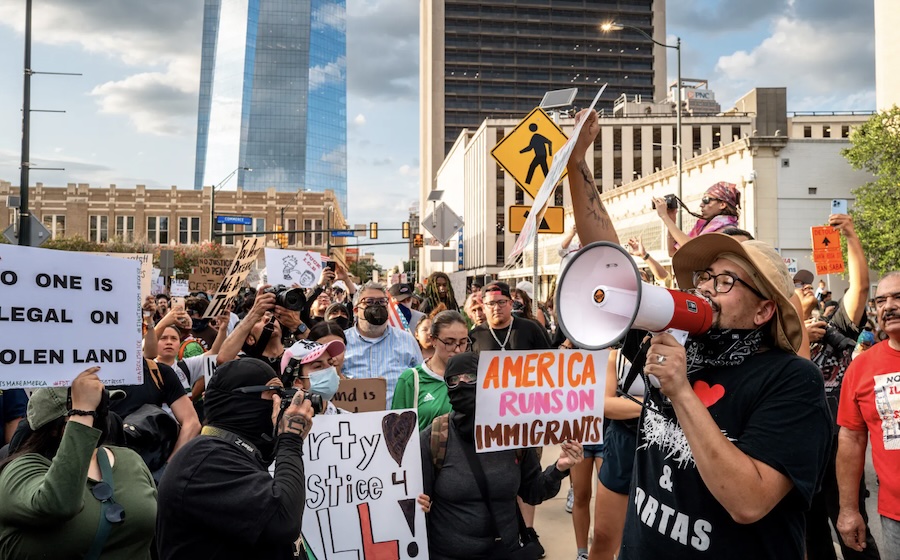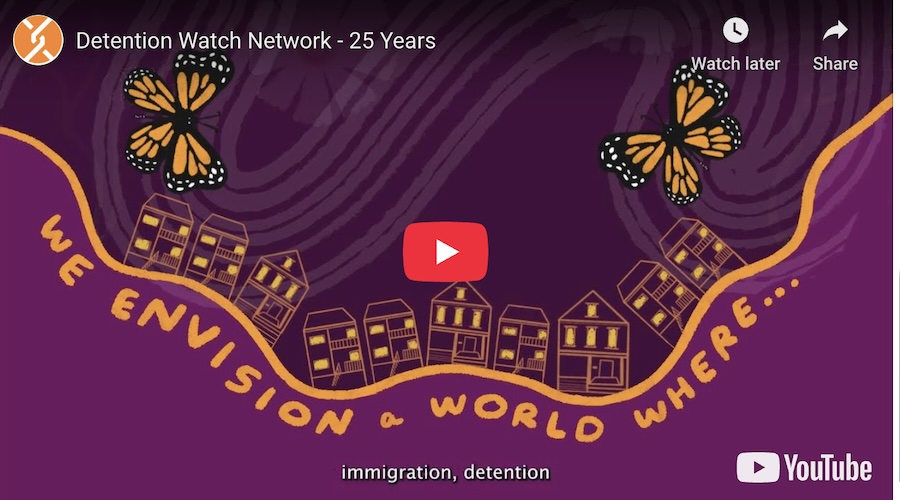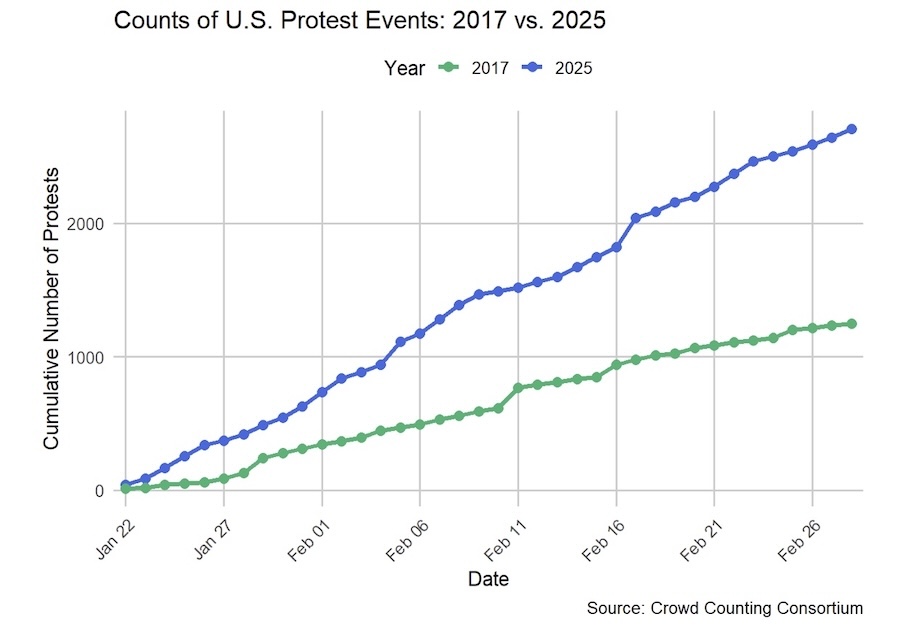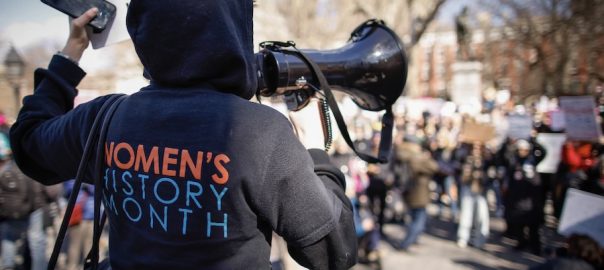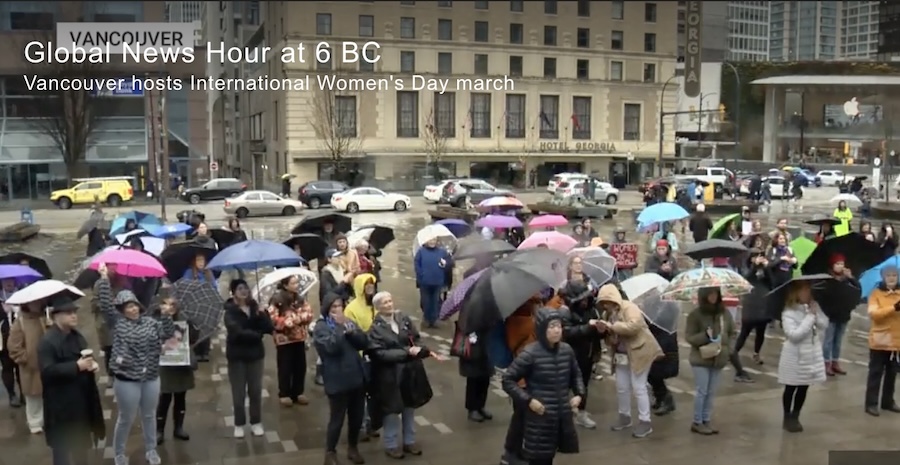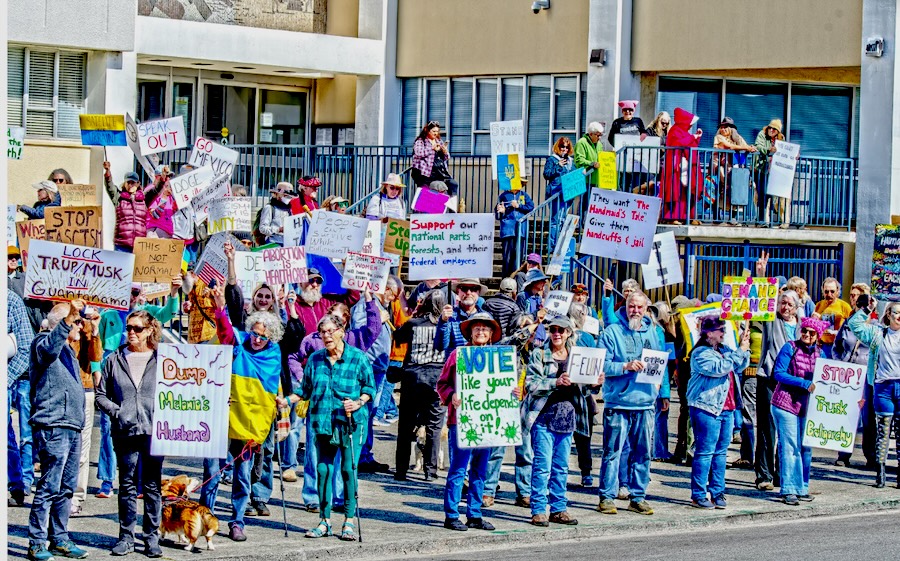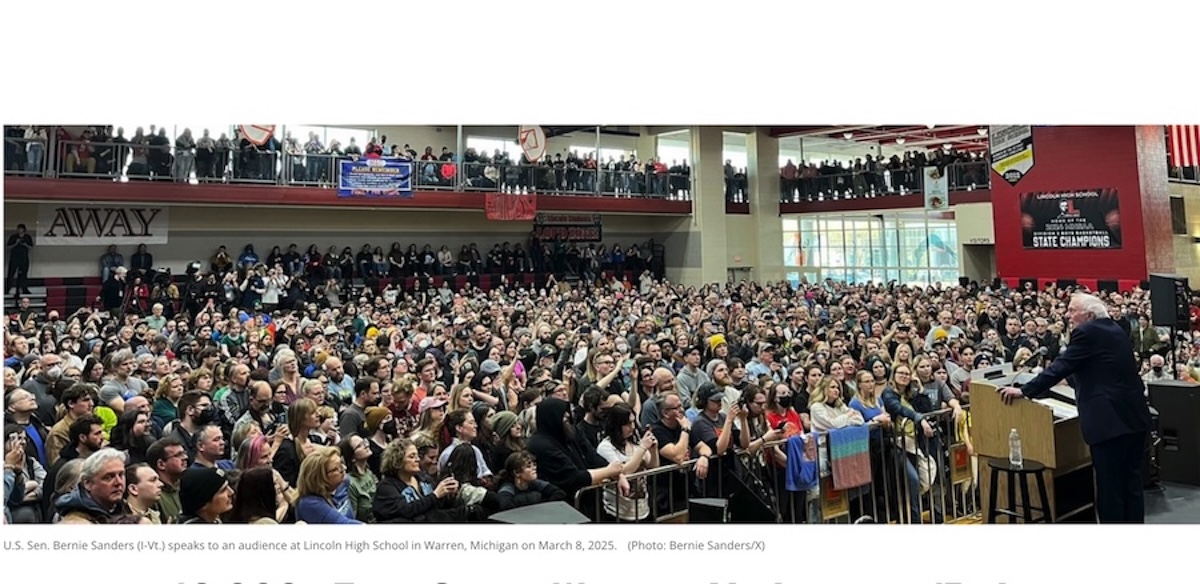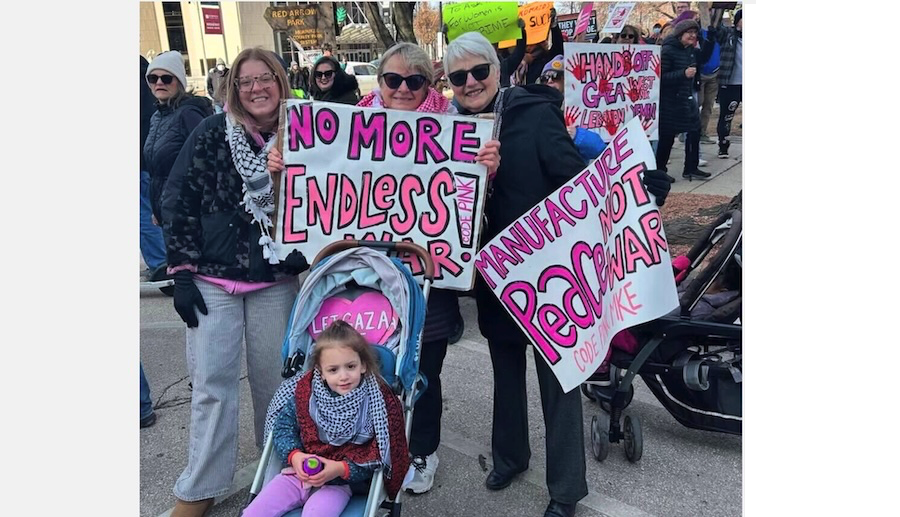FREE FLOW OF INFORMATION .
According to the American Civil Liberties Union , more than 5 million people participated in the No Kings rallies on June 14 to protest the escalating abuses of power by President Trump. Here are photos of No Kings rallies from all 50 states:

Montgomery resident Lyn Head holds a protest sign at the “No Kings” rally in Montgomery, Alabama on June 14, 2025. (Alander Rocha/Alabama Reflector)
(Alabama Reflector)

Protesters line the street in downtown Anchorage, Alaska. Bill Roth/Anchorage Daily News/AP. (CNN)

Frame from a video of NoKings protest in Phoenix, Arizona. (AZCENTRAL)
 Protesters carry signs across the Broadway Bridge between Little Rock and North Little Rock on Saturday, June 14, 2025. Thousands of people gathered for the No Kings march and rally, part of a nationwide show of dissent against President Donald Trump’s administration. (Tess Vrbin/Arkansas Advocate). (Arkansas Advocate)
Protesters carry signs across the Broadway Bridge between Little Rock and North Little Rock on Saturday, June 14, 2025. Thousands of people gathered for the No Kings march and rally, part of a nationwide show of dissent against President Donald Trump’s administration. (Tess Vrbin/Arkansas Advocate). (Arkansas Advocate)

Demonstrators march in the “No Kings” protest with a President Donald Trump balloon in Los Angeles on Saturday, June 14, 2025. (AP Photo/Noah Berger) (AP News)

Marchers participate in the “No Kings” protest in downtown Denver. Photo: Esteban L. Hernandez/Axios. (Axios)

Hartford: Demonstrators outside The Connecticut State Capitol chant during a No Kings protest that event organizers said an estimated 7000 people attended. Mark Mirko/Connecticut Public. (NPR)

More than a thousand people gathered in Wilmington on June 14, 2025, as part of “No Kings” day, a national day of protest planned on President Donald Trump’s birthday and the Army’s 250th anniversary celebration. ESTEBAN PARRA/DELAWARE NEWS JOURNAL. (Delaware Online)

Demonstrators hold a “No Kings” rally in West Palm Beach, Florida, on June 14, 2025, near President Trump’s Mar-a-Lago home.
GIORGIO VIERA/AFP VIA GETTY IMAGES. (CBS News

People take part in a “No Kings” protest at Liberty Plaza in Atlanta, Georgia. Photo: Elijah Nouvelage/AFP via Getty Images. ()

A huge crowd of demonstrators rally outside the State Capitol for Honolulu’s “No Kings” protest against the Trump administration today, one of several held around the state and about 2,000 across the country. JAMM AQUINO / JAQUINO@STARADVERTISER.COM. (Star Advertiser)

Thousands of protesters gathered outside of the Idaho Capitol Building in Boise Saturday, June 14, 2025 as part of the national “No Kings” protests against President Donald Trump and his administration. Sarah A. Millersmiller@idahostatesman.com. (Idaho Statesman)

Protesters gather at Daley Plaza holding placards and chanting slogans during a “No Kings” demonstration in Chicago, Illinois, on June 14, 2025.
Photo by Jacek Boczarski/Anadolu via Getty Images. (Common Dreams)

Protesters chant and march on Saturday, June 14, 2025, during a ‘No Kings’ protest at the Indiana Statehouse in Indianapolis. (USA Today)

Protesters from Nebraska and Iowa gather at Council Bluffs’ Tom Hanafan Park on what organizers say was a day of public demonstrations against President Donald Trump. (Courtesy of Blue Dot Nebraska/Blue Dots United). (Nebraska Examiner)

Community members gather at Watson Park for Lawrence’s No Kings protest as part of a nationwide movement, June 14, 2025. They hold signs with messages such as “Make America kind again” and “Rejecting kings since 1776”. Molly Adams / Lawrence Times. (Lawrence KS Times)

Thousands packed Jefferson Square Park, the steps of Metro Hall and Jefferson Street in Louisville, Ky. as part of the “No Kings” protest on Saturday, June 15, 2025. (USA Today)

Protestors walk down Decatur Street during the No Kings Day of Action protest in the Marigny neighborhood of New Orleans, Saturday, June 14, 2025. (Photo by Sophia Germer, The Times-Picayune) STAFF PHOTO BY SOPHIA GERMER. (NOLA)

‘No Kings’ protestors rally in Lincoln Park in Portland on June 14, 2025. Esta Pratt-Kielley/Maine Public. (Maine Public)

Video from Maryland (CBS News)

Protesters march along a street in Boston. | Kelly Garrity/POLITICO. (Politico)

People take part in a “No Kings” protest outside the Michigan Capitol in Lansing, Michigan, on June 14, 2025. JEFF KOWALSKY/AFP VIA GETTY IMAGES. (CBS News)

St. Paul: Demonstrators rally outside the Minnesota State Capitol building.
Stephen Maturen/Getty Images. (NPR)

A demonstration against the Trump administration was attended by several hundred protestors on the grounds of the Mississippi State Capitol in Jackson, Miss., on Saturday, June 14, 2025. Many attendees of the “No Kings Day” event held homemade signs declaring various causes of protest. SARAH WARNOCK/SPECIAL TO THE CLARION LEDGER. (Clarion Ledger)’’

St. Louis: Robert Hull, a 76-year-old demonstrator from St. Charles, left in green, protests alongside his granddaughter Maddie Flynn, 29 of Wentzville, center, during the No Kings protest, in downtown St. Louis. “I cannot stand to see injustices perpetrated against groups of people,” she said. “I have the privilege to speak up and my grandpa taught me to stand up for people who can’t stand up for themselves.” Brian Munoz/St. Louis Public. (NPR)
(article continued in right column)
The struggle for human rights, is it gathering force in the USA?
(article continued from left column)

Demonstrators take part in the “No Kings” protests in Livingston, Montana. Photo: William Campbell/Getty Images. (Axios)

Roughly 2,000 protesters in downtown Lincoln protest the Trump administration on Jun. 14, 2025. (Juan Salinas II/Nebraska Examiner).(Nebraska Examiner)

Protesters during the No Kings demonstration against President Donald Trump organized by the Northern Nevada chapters of Indivisible and the 50501 movement in front of the Capitol in Carson City on June 14, 2025. (David Calvert/The Nevada Independent). (a href=”https://thenevadaindependent.com/article/photos-thousands-gather-for-no-kings-protests-across-nevada”>The Nevada Independent)

Protesters began arriving in downtown Concord at noon on Saturday, June 14, 2025, about an hour before the scheduled start of the No Kings event. By early afternoon people lined both sides of the street in front of the State House. (Photo by Dana Wormald/New Hampshire Bulletin). (New Hampshire Bulletin)

A “No Kings” rally takes place on Springwood Avenue in Asbury Park, NJ on Saturday, June 14, 2025. (USA Today)

Thousands of Santa Feans join millions of other Americans in communities nationwide for a “No Kings Day” rally at the Roundhouse and a march to the Plaza on Saturday. The event is part of a nationwide protest against what demonstrators see as the Trump administration’s growing authoritarian stance and his pricey military parade in Washington that also took place Saturday. Jim Weber/The New Mexican. (Santa Fe New Mexican)

People take part in a “No Kings” protest in New York on June 14, 2025. Photo by CHARLY TRIBALLEAU / AFP. (Common Dreams)

People protest in Asheville, North Carolina. Allison Joyce/AFP/Getty Images. (CNN)
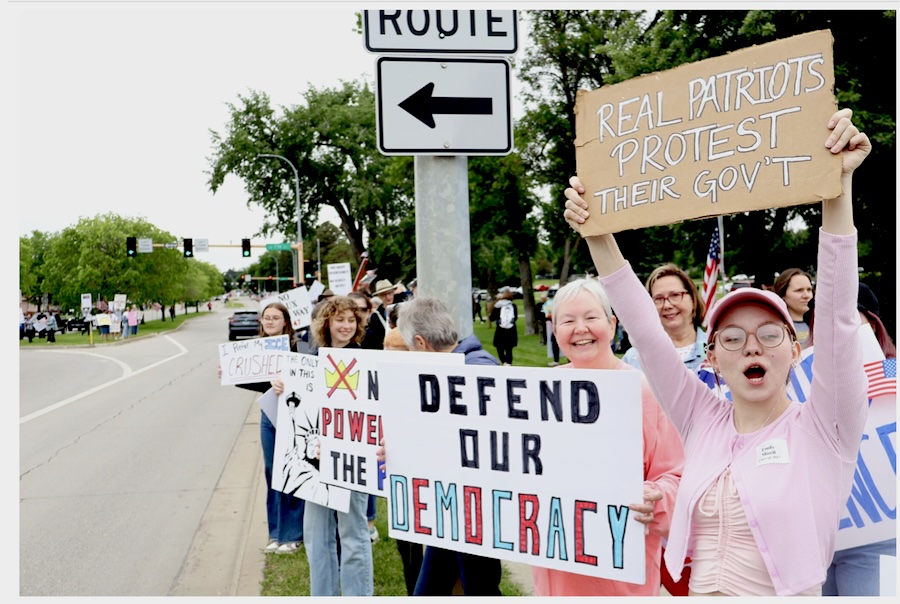
Emily Mizell, right, of Bismarck holds up her sign and cheers at passing cars near the Capitol in Bismarck during the nationwide No Kings protests on June 14, 2025. (Michael Achterling/North Dakota Monitor). (North Dakota Monitor)

Demonstrators march down a street in Cincinnati, Ohio. Jason Whitman/NurPhoto/Associated Press. (CNN<:a>)

Tulsa: Protesters gather for protest in downtown Tulsa. Ben Abrams/KWGS. (NPR)

Demonstrators cross the Hawthorne Bridge as they take part in the “No Kings” protest, Saturday, June 14, 2025, in Portland, Ore. (AP Photo/Jenny Kane). (AP News

Philadelphia: Demonstrators fill Eakins Oval in front of the Philadelphia Museum of Art. Yuki Iwamura/AP. (NPR)
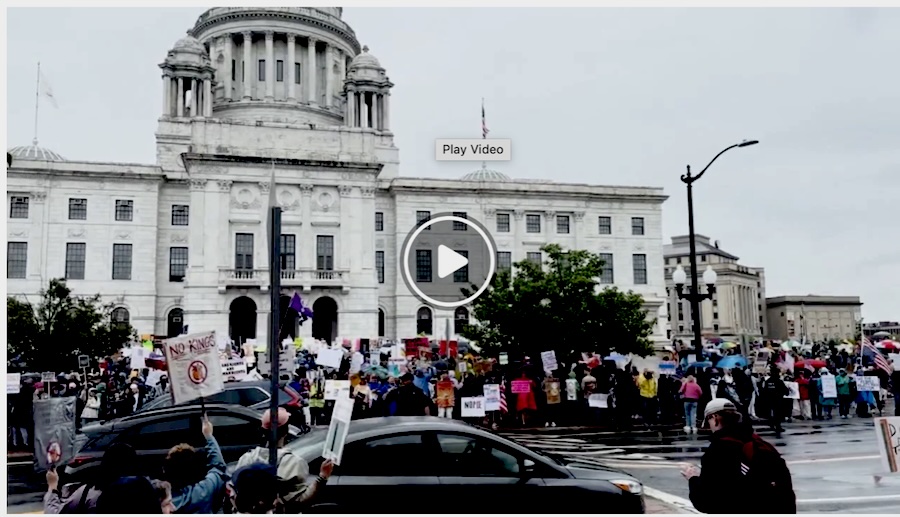
Video of protest in Providence. (ABC6

Thousands attend a protest at the South Carolina Statehouse in Columbia Saturday, June 14, 2025, as part of the coast-to-coast “No Kings” grassroots protest event in opposition to the Trump administration. (Photo by Jessica Holdman/SC Daily Gazette). (SC Daily Gazette)

Sioux Falls demonstrators line Minnesota Avenue as part of the national “No Kings” protest. (Argus Leader

People demonstrate during a “No Kings” protest Saturday, June 14, 2025, in Nashville, Tenn. George Walker IV/AP. (NPR)

People gather at the “No Kings” nationwide demonstration on Saturday, June 14, 2025 in Houston. (Raquel Natalicchio/Houston Chronicle via AP). (AP News)

(Francisco Kjolseth | The Salt Lake Tribune) An estimated 10,000 walk the streets of downtown Salt Lake City for a No Kings demonstration on Saturday, June 14, 2025. (S L Trib)

A drone view shows protesters holding a “We the People” sign in Bennington County, Vermont. Michael Beach/Reuters. (CNN)

Charlottesvile, VA.: People take to the streets to protest. Shaban Athuman/VPM News. (NPR)

Seattle: Demonstrators cheer after getting a horn from the Seattle Monorail while marching from Cal Anderson Park to Seattle Center. Megan Farmer/KUOW. (NPR)

‘No Kings’ demonstrators rallied at the West Virginia Capitol, Charleston, June 14, 2025. (WV Public)

Drone footage shows scale of Milwaukee No Kings protest. Cathedral Square Park was filled with people attending the No Kings protest against the Trump administration. (JS Online)

The Jackson Police Department estimated anywhere from 225 to 300 people gathered on the Town Square for a “No Kings” protest Saturday, June 14, 2025. Participants estimated 500. (Rebecca Huntington/WyoFile). (Wyo File)
– – – – –
If you wish to make a comment on this article, you may write to coordinator@cpnn-world.org with the title “Comment on (name of article)” and we will put your comment on line. Because of the flood of spam, we have discontinued the direct application of comments.

